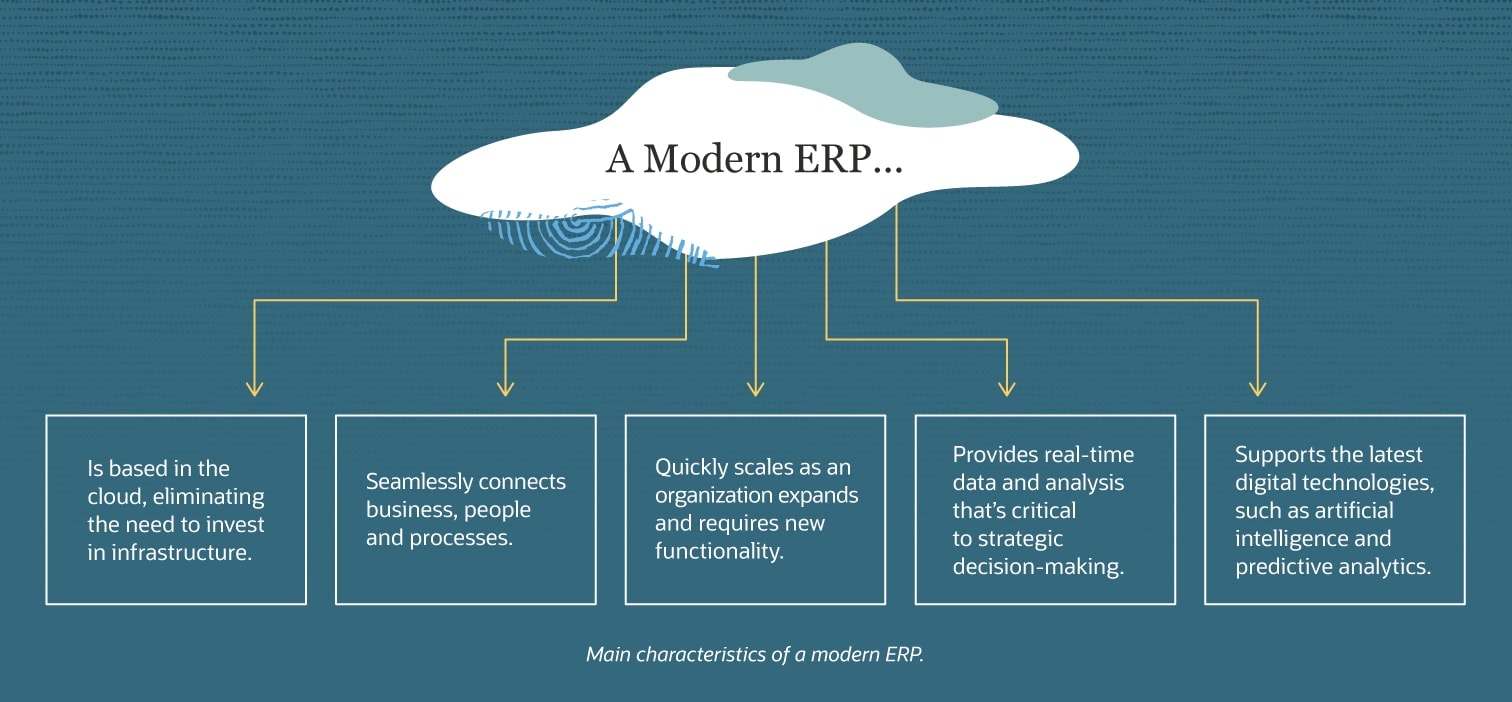Modern enterprise resource planning (ERP) systems are key to business success in today's volatile economy because they drive cost savings, process and productivity improvements and automated data insights that lead to better-informed decision-making. Consequently, the global market for ERP systems shows no sign of slowing. In fact, ERPs continue to become more advanced as new digital platforms and technologies, including cloud computing and machine learning, come to the fore, providing organisations with always-on, real-time visibility into the full spectrum of their business operations.
What Is a Modern ERP?
Early ERP systems date to the 1960s as materials requirement planning (MRP) systems, which were used primarily by manufacturers for tracking product inventory and production. By the early 1990s, ERPs had developed in their own right, and businesses in other industries recognised how ERP could provide insight about their financial health and operational efficiencies — or lack thereof — across myriad departments, such as accounting, sales, procurement and eventually human resources. These systems resided on-premises, requiring a large, upfront investment in hardware, software and the IT consultants to implement, upgrade and maintain everything.
Over the past two decades, the emergence of service-oriented architectures and later the introduction of more advanced cloud and mobility frameworks paved the way for "ERP 2.0." That's why, now, a hallmark of modern ERP is that it's based in the cloud, meaning the cloud vendor is responsible for its setup, storage, maintenance and security.
A modern ERP centralises data from all parts of an organisation for real-time decision-making, is device-agnostic and is personalised to the role of each of its business users. For example, a procurement manager needs to view different data than, say, an HR or payroll manager. But because all the data in an ERP is integrated, modern ERPs can create an uncommonly valuable business context: Even though every business manager in every department gets a view of data structured to the needs of their own particular role, because that data comes from the organisation's single common data source it's also consistent across the entire business.

Modern Cloud ERP Platform Features
Cloud computing — the on-demand delivery of computing, storage and applications via the internet — has quickly changed the way companies run their business systems, including ERP. By definition, a modern ERP is based in the cloud. It pulls in and integrates data via individual modules that connect to different areas of the business, so intelligence is accessible to decision-makers at any time and from any device.
Additional features of a modern ERP platform include:
- Embedded, real-time analytics: The sooner the business realises something is off, the sooner it can fix it. So, access to real-time analytics oriented for a particular role, right in the ERP dashboard, is critical to strategic decision-making and operational improvements. That, in turn, can lead to greater efficiencies, cost savings and customer satisfaction. For example, automated real-time analytics can alert the business to a sudden slowdown in order fulfillment, which could indicate a problem in the order-picking process or a supply-chain issue. That analysis can lead to instant action.
- Personalised dashboards: Data is presented in personalised dashboards with key performance indicators (KPIs) tailored to the role of the person using it. For example, a warehouse manager will need to see different KPIs than a payroll manager or marketing manager. But because all of the business's data is integrated, everyone is working from the same information source.
- Built-in security: According to one estimate, as much as 50% of all corporate data is stored in the cloud. Factor in the different devices business leaders can use to access the cloud, and the potential for data loss as the result of breach is clear, potentially costing a business financially and impacting brand reputation and customer trust. Modern ERPs include built-in security tools that provide strong encryption; allow the business to establish security policies, verify user identities and set access privileges; and institute protections such as single sign-on and multifactor authentication.
- Ability to scale: Unlike legacy, on-premises systems, cloud-based, modern ERPs can scale rapidly along with the growing businesses they support. Business growth can come in many forms, such as the addition of a new department or division, expansion to new locations or countries, or through a merger and acquisition. Modern ERP systems work with modules, each one designed for a specific business function, such as finance or customer relationship management, and each can be added as needed — meaning the same ERP platform stays in place as a business's requirements expand.
- Advanced technologies: Modern ERP systems also include emerging technologies to automate manual, error-prone business processes and tasks and provide for deeper, predictive data analysis that helps a company, for example, forecast buying patterns and adjust product production to match. Modern ERP systems also support real-time data collection from internet of things (IoT) devices, such as handheld scanners and wireless sensors.
ERP Benefits
Modern ERP systems provide companies with a real-time, integrated view of their core business processes. They are hosted in the cloud and managed by a provider that handles all aspects of the system — hardware, software, upgrades, storage and more — freeing the company's in-house staff for other important projects and innovation that may lead more directly to competitive advantage.
Another critical benefit: Companies save substantially on the many upfront infrastructure costs associated with having to purchase, implement and maintain an ERP on-premises. This is especially attractive to growing businesses with smaller budgets. Data about overall company performance, workflows and more is available in real time, leading to faster, more informed and collaborative decision-making among business team leaders no matter where they are or what devices they're using.
A modern ERP system also supports high levels of flexibility, agility and scalability as a business grows and changes. Its modular design means new functionalities can be deployed quickly and easily. A modern ERP also integrates with other cloud products and data sources, ranging from social media to external data analytics. This makes it easier for a business to view events in context, identify trends, boost productivity and realign strategies as needed.
All of this data — as well as its processing, storage and sharing — must be secured and in compliance with each industry's regulations. The job of data security rests on the cloud ERP vendor and system, in the form of identity and access management, data encryption and multifunction authentication to help safeguard data against cyberattacks.
ROI of ERP
The cost savings from choosing a cloud-based ERP system are evident in both the short and long term. From the start, a modern ERP eliminates the need for large, upfront purchases of hardware and software required for an on-premises installation, as well as the facilities needed to house all of the equipment. Instead, a cloud vendor hosts and manages the software, which is delivered as a service via the internet.
Savings are also derived in the costs and time needed by IT staff to plan, deploy and maintain the ERP. Instead, IT teams have more time to develop the strategic architecture of the ERP deployment that aligns best with their business and organisational structure and culture, as well as to pursue other strategic projects and areas of innovation that, over time, can fuel business growth and revenue. The same applies to the ability to quickly add new features and functions as the business scales.
Automation is another way modern ERPs prove their value, particularly as it relates to the performance of highly complex data processing and integration across an organisation's many different functions. The resulting analyses can, for example, lead to more informed decision-making and swift improvements in business processes and workflows that translate to significant cost savings.
Deploying Modern ERP
Selecting a modern ERP system requires forethought about a business's strategic objectives at both the organisational and departmental levels. The actual deployment is the cloud provider's job, which is part of its allure. Among the planning points to consider:
- Identify and analyse your existing environment and challenges. This includes spotting process inefficiencies, obstacles to growth, an inability to meet customer expectations, insufficient data for real-time decision-making and the cost of an existing system.
- Assess the benefits of ERP. Create a list of achievable goals. This might include reducing manufacturing delays, speeding payroll processes, improving customer satisfaction levels, boosting cash flow or increasing employee retention.
- Estimate costs. Despite the many ways a cloud ERP can save a business money, costs can be sizable depending on the number of subscription licences, number of users, customisation needs, third-party software integrations and training. Understanding them in advance can help a business properly budget and avoid surprises.
- Identify risks. One modern ERP reality is that a cloud provider has access to your company's (and customers') sensitive data. That can be an understandable concern, as is the possibility of a data breach or the internet going down for any period of time. You'll want to ensure the cloud provider has disaster-recovery and business-continuity plans in place for all scenarios.
Why NetSuite Is the Best Modern ERP
NetSuite ERP was designed and built for the cloud, with tools, services and modules aimed specifically at growing businesses. ERP modules are designed for specific business functions, such as accounting, supply chain management, manufacturing, human resources management and marketing automation. NetSuite's modern ERP provides organisations with real-time visibility into their operations, deep insights that drive cost savings and productivity gains, and improved automation capabilities that lead to more informed decision-making.
Conclusion
Enterprise resource planning (ERP) systems have come a long way since their origins amid 1960s mainframe computing. A modern ERP is, by its nature, based in the cloud, and embedded with advanced analytics and automation capabilities that provide real-time, integrated insights from across a business's many functional areas. These characteristics save businesses time and budget no longer needed to purchase, install and maintain their own systems, enabling them to invest in growth and expansion, find new ways to improve operations and focus on areas of innovation.
#1 Cloud ERP
Software
Modern ERP FAQs
What is a current trend in ERP systems?
Organisations are turning to modern ERP to reduce internal IT demands, gain broader and deeper insights into business conditions, and improve data security and regulatory compliance. Cloud-based ERP lets them connect data and information in new and innovative ways — and ultimately gain greater insight.
How does a modern ERP system work?
A provider hosts the ERP system on its systems in the cloud. Its modular applications can be added when needed and are always available, with updates and patches taking place automatically and transparently. As a result, an organisation is always using the latest and most secure version of the software.
What is postmodern ERP strategy?
The research firm Gartner defines postmodern ERP as a "technology strategy that automates and links administrative and operational business capabilities (such as finance, HR, purchasing, manufacturing and distribution) with appropriate levels of integration that balance the benefits of vendor-delivered integration against business flexibility and agility."









